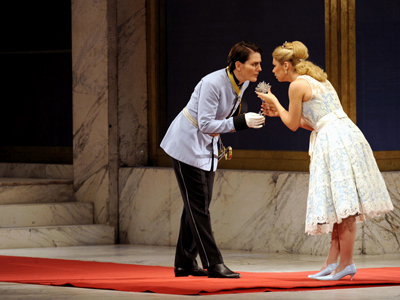
By ANDREW POWELL
Published: June 6, 2015
MUNICH — After the genetic mismatch of Kirill Petrenko and Gaetano Donizetti here, it was a relief to watch the conductor easily navigate and ignite the tone rows of Lulu last week (May 25 and 29) at the National Theater. Happily he did so using Cerha’s reconstitution of Act III and supported by an eloquent, virtuosic Bavarian State Orchestra, now truly his orchestra twenty months beyond the systemic jolt of the handover from Kent Nagano.
The GMD conveyed the differing compositional powers of each act almost entirely through soft, finely balanced ensemble, favoring transparency. Where the music rose dynamically, as in his ardent account of the palindromic Act II Zwischenspiel or the pithy societal interjections of the Paris scene, its contours and colors palpably stunned the capacity audience.
For these reasons alone these were luxurious traversals of Berg’s stimulating, exacting, 185-minute score. They revolved, though, not around Petrenko but upon the musicianship of the charming and beautiful Marlis Petersen, 47, who drew rapturous applause at evening’s end.
Meek early on, she sang out fully in the anti-heroine’s Act I duettino with the Painter (Rainer Trost on vivid form) and gauged her sound with Lied-art intelligence — but a diva’s command of the stage — from that point forward. The bright firm voice sailed into the house with greater body of tone than many a Lulu, shaded emotionally and locked into Berg’s text.
Having first essayed the role sixteen years ago in Kassel, Petersen has developed crisp, moving inflections for its unaccompanied dialog and Sprechstimme, and on these nights she fashioned from every last morsel the composer provides a gutsy, honest, amusing, vulnerable and above all integrated portrayal.
Daniela Sindram had a harder time making an impact as the pivotal Gräfin Geschwitz in this new production. In fact the mezzo barely stood out at all because director Dmitri Tcherniakov (pictured with the soprano) put her in pants, muting her sexuality and defeating the counterforce Berg intended to the men around Lulu. (Has Tcherniakov only this narrow grasp of what it means to be a lesbian?)
But she sang expressively, with a golden, even timbre, purity of line and good diction, and she capped her interrupted London monologue with a ravishing Lulu! Mein Engel! That last outpouring endured the distraction of Lulu’s death on stage, contrary to Berg’s plan, and so the drama ended out of kilter as the tempos slowed, and anticlimactic.
Lyric tenor Matthias Klink introduced a sweet-toned Alwa whose volume lessened in high-lying phrases. Bo Skovhus, as his father and Lulu’s lethal client, made a perfect foil for Petersen, magnetic of gesture and clever in pointing the text, even if his tenorial baritone lacked ideal resonance. In the supporting roles, besides Trost, Wolfgang Ablinger-Sperrhacke’s mellifluous turn as the Marquis stood out.
Like most productions at Bavarian State Opera nowadays, this Lulu will look its best through camera lenses rather than from a seat in the theater. Tcherniakov sets all scenes in one static grove of glass panels, much as he locked us in a gray seminar room for his last work here, Simon Boccanegra. Glass of course is an upgrade: it affords depth, allows vivid use of light and overcomes staging challenges, such as when characters scenically snoop. But only the panning and zooming of cameras can make up for missing spectacle in this case.
During Berg’s several Zwischenspiele — intended for scene changes tracing Lulu’s progress and retrogression — the director populates the background panels with stiffly animated mimes, like mannequins in shop windows. Perversely, given today’s common use of projections, he offers no film for the Filmmusik, but a roving spotlight signals its crucial midpoint.
Placement of the panels forces most of the crowd in the Paris scene behind glass, and Tcherniakov drably lines everyone up in a row. Otherwise he strongly shapes and moves the individual characters and, with the one misstep of Geschwitz’s costuming, engages the viewer convincingly, avoiding cliché and graphic violence.
Today’s performance of Lulu, the fourth in a run of five, streams live at noon, New York time, at www.staatsoper.de/tv. (Although named “Staatsoper.TV,” the service is not accessed at that domain.) Three performances are scheduled for September, when Petrenko hands over to Cornelius Meister.
Photo © Wilfried Hösl
Related posts:
Benjamin and Aimard
U.S. Orchestras on Travel Ban
Mastersingers’ Depression
Netrebko, Barcellona in Aida
Pintscher Conducts New Music


